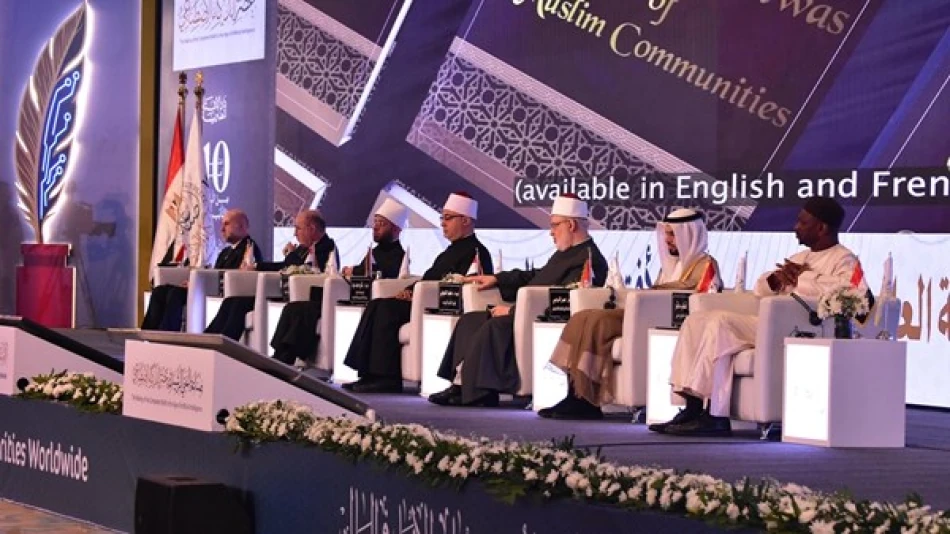
UAE Fatwa Authority Showcases AI-Powered Fatwas: Modernizing Islamic Jurisprudence
UAE's Islamic Council Leads AI Integration in Religious Rulings at Global Summit
The UAE Council for Sharia Fatwa has positioned itself at the forefront of digital transformation in Islamic jurisprudence, showcasing advanced AI-powered platforms for religious guidance at an international conference in Cairo. This strategic move reflects the Emirates' broader vision of modernizing traditional institutions while maintaining religious authenticity—a balance that could reshape how Islamic guidance adapts to the digital age globally.
Institutional Innovation Meets Religious Tradition
At the "Crafting the Wise Mufti in the Age of Artificial Intelligence" conference, organized by the General Secretariat of Fatwa Houses and Bodies Worldwide, the UAE delegation demonstrated how artificial intelligence can enhance religious consultation services without compromising doctrinal integrity.
The council's participation, led by Deputy Chairman Dr. Omar Habtoor Al-Darei and Secretary-General Dr. Saba Salem Al-Kaabi, highlighted the UAE's commitment to what officials termed "institutional civilizational jurisprudence"—a framework that balances religious constants with technological advancement.
Digital Platform Showcases Practical Implementation
The UAE delegation presented their digital platform for fatwa services, which integrates AI capabilities to manage religious inquiries while maintaining high cybersecurity standards. This system represents a practical application of technology in religious governance, offering a template that other Islamic institutions worldwide are likely to study and potentially adopt.
Strategic Positioning in Regional Competition
The UAE's proactive approach to AI integration in religious institutions mirrors its broader strategy of technological leadership in the Middle East. While Saudi Arabia focuses on mega-projects like NEOM and Qatar invests heavily in AI research, the Emirates is carving out expertise in the sensitive intersection of technology and religious authority.
This positioning could prove economically significant. As Muslim-majority countries seek to modernize their religious institutions, the UAE's experience and platforms may become exportable services, potentially creating new revenue streams in the growing Islamic fintech and governance technology sectors.
Addressing Extremism Through Technology
Dr. Al-Darei emphasized protecting fatwa systems from "fragility" and preventing the exploitation of religious rulings for extremist or ideological purposes. This concern reflects broader regional security priorities, where governments increasingly view religious moderation as essential for stability and economic development.
The council's approach of building "secure and reliable databases" suggests a systematic effort to standardize religious guidance—potentially reducing the influence of unauthorized or radical interpretations that have historically complicated governance in the region.
Global Implications for Islamic Finance and Governance
The integration of AI in Islamic jurisprudence carries significant implications for the global Islamic finance industry, worth over $3 trillion. Standardized, technology-enhanced religious rulings could streamline product development and regulatory compliance across borders, potentially accelerating growth in Islamic banking, insurance, and investment products.
For multinational corporations operating in Muslim-majority markets, AI-powered fatwa systems could provide faster, more consistent guidance on business practices, reducing compliance costs and regulatory uncertainty.
Competitive Advantage in Religious Soft Power
The UAE's technological approach to religious authority represents a sophisticated form of soft power projection. By positioning itself as a moderate, innovative voice in Islamic jurisprudence, the Emirates strengthens its influence among global Muslim communities while differentiating itself from more conservative regional competitors.
This strategy aligns with the UAE's broader economic diversification goals, as religious authority increasingly intersects with financial services, education, and digital governance—sectors where the country seeks continued growth beyond oil revenues.
Most Viewed News

 Layla Al Mansoori
Layla Al Mansoori






